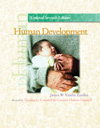 |  Human Development: Updated, 7/e James Vander Zanden,
Ohio State University
Thomas Crandell,
Broome Community College
Corinne Crandell,
Broome Community College
Adolescence: Physical and Cognitive Development
Chapter OutlineIn adolescence, one's biological, social, and moral foundations all go through rapid changes. The complete transition to physical and reproductive maturity occurs, with accompanying adjustments in identity, social interactions, cognitive abilities, and moral values. The following areas are specifically examined in Chapter 11:
1Puberty. The physical development and maturity issues that accompany the adolescent growth spurt for both boys and girls are presented. The implications of growth variations and sexual maturation on adolescent personality and behavior are also discussed. |
 |  |  | 2Health Issues. The effects of smoking, drugs, alcohol, STDs, and stress are examined. |
 |  |  | 3The Development of Identities and Self-Concepts. Adolescence is a time of egocentricity and needing to be like others. Anyone who is perceived as "different" may have difficult experiences. Within this context, the development of individual differences in identity, the impact of the timing of maturation, the nature of obesity, and the body-image disorders of anorexia and bulimia are examined. Some recent studies are presented which suggest that girls emerge from adolescence with a poorer self-image than boys. |
 |  |  | 4Cognitive Development. By older adolescence, most teenagers acquire the ability for logical reasoning and abstract thought, known as the period of formal operations. |
 |  |  | 5Moral Development. During adolescent transition, most teenagers also attain Kohlberg's postconventional stage of morality. Their political thinking becomes more abstract and idealistic. |
|



 2003 McGraw-Hill Higher Education
2003 McGraw-Hill Higher Education